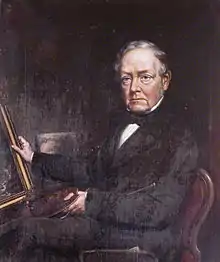David Gee (artist)
David Gee (Coventry, 1793 – 1872) was an English oil painter who took his inspiration from the local area.
David Gee | |
|---|---|
 Self portrait (c. 1868) | |
| Born | 1793 |
| Died | 1872 |
Gee mostly painted battle scenes, landscapes as well as pictures inspired by local legends such as Lady Godiva.[1] He was active as a painter between the years of 1815 and 1868. He died in 1871 or 1872.[2]
In 1831, Gee began restoration work on the Holy Trinity Doom, an early 15th-century painting of the Last Judgment.[3][4] He received five guineas for his work.[4] There is little contemporary information about Gee's work on the Doom, but conservation work begun in 1995[5] suggests he added outlines to the figures and repainted or recoloured some areas. There is no evidence that Gee significantly changed the painting's composition or symbolism.[4] Gee also applied a coating of megilp to the painting.[4] This bituminous varnish soon degraded and by 1873 the Doom was 'almost invisible'.[6]
References
- Kemp, David (1992). Pleasures and Treasures of Britain: A Discerning Traveller's Companion. Dundurn Group Ltd. p. 236. ISBN 978-1-55002-159-2.
- Mallalieu, H.L (1976). The Dictionary of British Watercolour Artists up to 1920. Baron Publishing. p. 108. ISBN 978-0-902028-48-7.
- "Holy Trinity Church, The painting of the Last Judgement". Retrieved April 4, 2012.
- Gill, Miriam (2011). Monckton, Linda; Richard K. Morris (eds.). Coventry Medieval Art, Architecture and Archaeology in the City and its Vicinity. Maney Publishing (for The British Archaeological Association). pp. 206–222. ISBN 978-1-906540-62-3.
- "Granville & Burbidge, The Holy Trinity Doom". Retrieved April 4, 2012.
- "Holy Trinity Church Coventry, The Medieval Painting". Retrieved April 4, 2012.
External links
- 15 paintings by or after David Gee at the Art UK site
